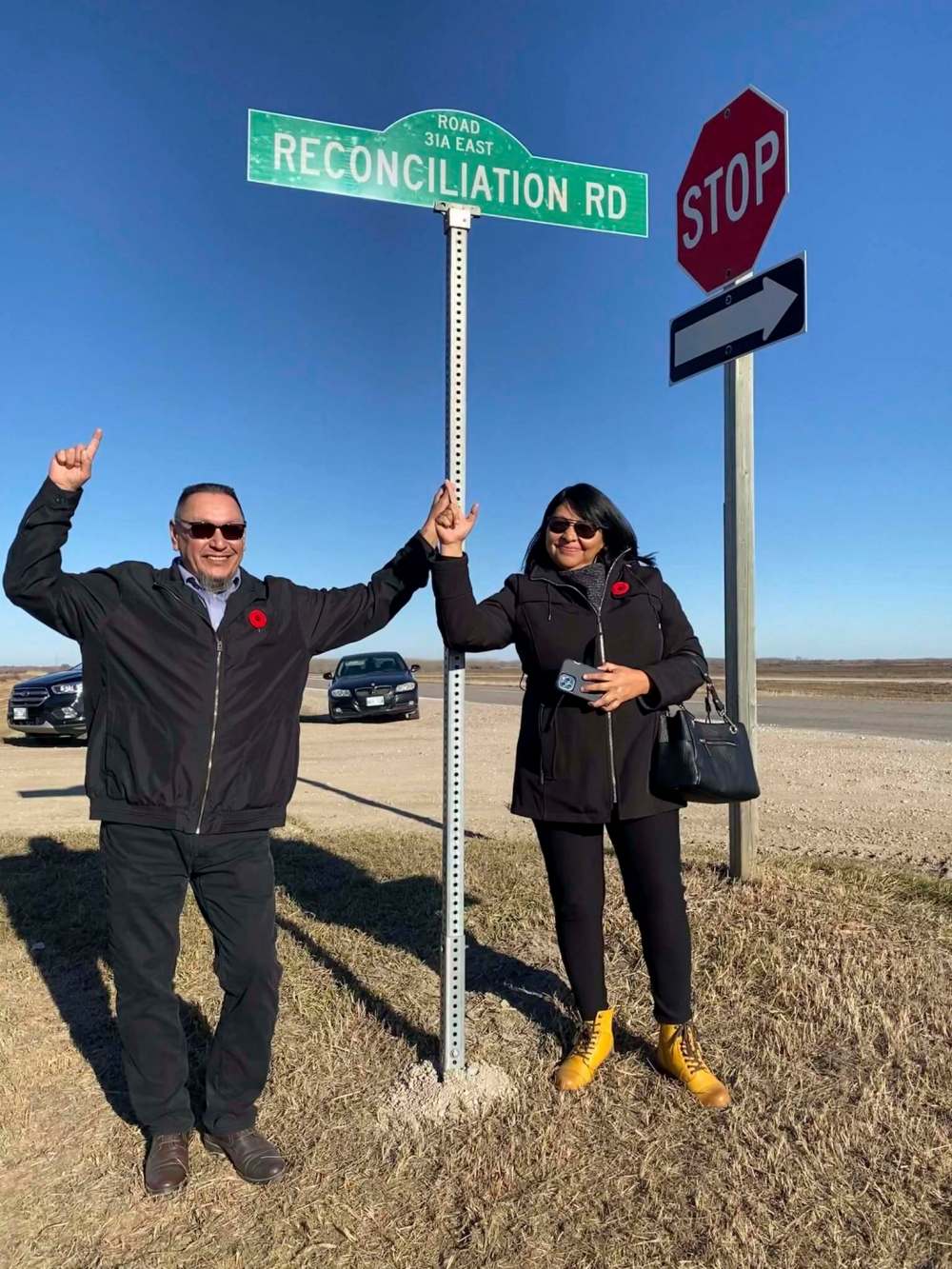Reconciliation Road a step to ease pain, sadness along Highway 59
Advertisement
Read this article for free:
or
Already have an account? Log in here »
To continue reading, please subscribe:
Monthly Digital Subscription
$0 for the first 4 weeks*
- Enjoy unlimited reading on winnipegfreepress.com
- Read the E-Edition, our digital replica newspaper
- Access News Break, our award-winning app
- Play interactive puzzles
*No charge for 4 weeks then price increases to the regular rate of $19.00 plus GST every four weeks. Offer available to new and qualified returning subscribers only. Cancel any time.
Monthly Digital Subscription
$4.75/week*
- Enjoy unlimited reading on winnipegfreepress.com
- Read the E-Edition, our digital replica newspaper
- Access News Break, our award-winning app
- Play interactive puzzles
*Billed as $19 plus GST every four weeks. Cancel any time.
To continue reading, please subscribe:
Add Free Press access to your Brandon Sun subscription for only an additional
$1 for the first 4 weeks*
*Your next subscription payment will increase by $1.00 and you will be charged $16.99 plus GST for four weeks. After four weeks, your payment will increase to $23.99 plus GST every four weeks.
Read unlimited articles for free today:
or
Already have an account? Log in here »
Hey there, time traveller!
This article was published 11/11/2021 (1494 days ago), so information in it may no longer be current.
There is a new Reconciliation Road in Manitoba, and the grandson of a Canadian Indigenous war hero is delighted to have played a part in putting it on the map.
“This is for my dad,” Earl (Buddy) Prince said Monday on National Indigenous Veterans Day. “I know that he would be very, very proud of what we accomplished here today.”

The accomplishment was having the name of a dirt road on the south side of Highway 59 in the RM of St. Clements previously known as Colonization Road officially renamed. The highway runs adjacent to Brokenhead Ojibway Nation, about 45 minutes north of Winnipeg.
Prince is a member of the First Nation who regularly drove to and from the community, passing the accurately ― and insensitively ― named road each time.
Prince’s father, Thomas Edward Prince, was the son of Sgt. Tommy Prince, one of Canada’s most decorated Indigenous war heroes. He was the oldest of 11 brothers and sisters. And just as his grandfather did in the early years, Buddy’s father also attended residential school and struggled as a result throughout his life.
Help available
The Indian Residential Schools Resolution Health Support Program has a hotline to help survivors and their relatives suffering with trauma: 1-866-925-4419
“You know, passing this road every day, it just reminded me of my dad and the abuses he suffered,” Prince said, explaining how he and his wife Lisa drove by the intersection one day and she suggested he do something about it.
Not sure how to even begin, he wrote a compelling Facebook post, inquiring about how to change the name of this road. He tagged municipal politicians and brought up the subject with the Brokenhead band council. On Sept. 11, 2020, leaders from the First Nation and the RM of St. Clements met and agreed to work together to begin the renaming process.
It took about a year of consultations, legislation passing and community involvement to see the effort come to fruition Monday when the Reconciliation Road sign went up during a small ceremony to mark the occasion.
Brokenhead Chief Deborah Smith and RM of St. Clements Mayor Debbie Fiebelkorn spoke of the partnership between the two communities.
“It feels amazing. I feel very proud,” Prince said, as he took in a deep breath, closed his eyes and tried to steady his voice as vehicles sped past.
His father, who served for years as Brokenhead’s chief and on its council, died in 2007 from leukemia at the age of 62.
“You know, he went through a lot and we went through a lot with him because of his experience,” Prince said.
“It was six months before he passed away and lost his fight against cancer that my dad finally broke down and told me why he was the way he was, and what happened to him at residential school.”
The abuses that Tommy Jr. suffered left wounds so deep that they shaped the entirety of his life. He held onto them and his experiences in secrecy and shame that manifested into anger and depression. He tried to ease his pain with alcohol until he finally spoke his truth in the closing months of his life.
When he shared the horrors that he had endured in residential school he began to heal and, as a result, his children did, too.
They started to see a different side of the man who had been trapped for so many years underneath layers of deep-rooted trauma.
“Everything clicked. I understood why he was so angry and why he took it out on us. It was an eye-opener,” Prince said. “After it was revealed and we talked about it, the last six months of his life were the best days of my life.
“He’s always on my mind, especially when I pass this road every day. I’m sure I’m not the only one who felt like this. For anyone who has gone through residential school, or for anyone who knows someone who has gone through residential school — to come across Colonization Road is a slap in the face. We don’t have to go through that anymore.”
shelley.cook@freepress.mb.ca
Twitter: @ShelleyAcook

Our newsroom depends on a growing audience of readers to power our journalism. If you are not a paid reader, please consider becoming a subscriber.
Our newsroom depends on its audience of readers to power our journalism. Thank you for your support.
History
Updated on Thursday, November 11, 2021 12:54 PM CST: Adds fact box


